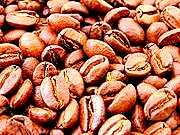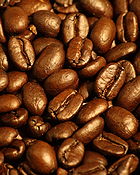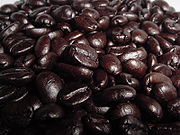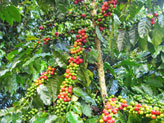
|

That's a great cup of coffee!
1. The Roast Level
There are ever so many things that can go wrong in trying to brew that perfect cup of coffee. Likewise there are ever so many things that need to go right. In first order before anything you need to have great coffee. That means a high grade arabica bean proficiently and freshly roasted. Secondarily you need to decide what types of flavor that you prefer in the selection of the roasted product. There are ever so many countries to choose from with numerous profiles. Don't worry about any of that in the beginning. K.I.S.S. (Keep It Simple Stupid).  Just focus in the early stages of perfecting that perfect cup on whether you like your coffee to have a slightly sour taste or perhaps a slightly bitter taste. Light roast coffees tend to have more acid that hasn't been neutralized in the carbonization of the roasting process and therefore they tend to have more sour profile tastes with more acidity. Darker roasts have neutralized more of the acids in the roasting process and end up with less acidity but have rather bitter characteristics due to the slight carbonization of bean. I usually recommend for people to start off in the medium roast profile range and then gradually try roasts that are lighter and darker until they figure out what best suits their individual tastes. I would say that black coffee in general tastes great in light, medium, and dark roast profiles, and also taste great with cream. However, the lighter roast coffees will usually have the sour nature of their roast profiles enhanced by the addition of cream or other dairy products. My basic theory, short and simple, is dark roasted coffee goes well with or without cream but that light roasted coffee is better enjoyed black. As for sugar I usually recommend for people to try their best to stay away from all sweeteners in coffee. Most people given time will learn to love and enjoy coffee unadulterated but if continually altering the already present sweet taste already inherent in coffee they will truly me missing coffees great reward: Sweet deliciousness, virtually calorie free, with an energy boost to boot. Just focus in the early stages of perfecting that perfect cup on whether you like your coffee to have a slightly sour taste or perhaps a slightly bitter taste. Light roast coffees tend to have more acid that hasn't been neutralized in the carbonization of the roasting process and therefore they tend to have more sour profile tastes with more acidity. Darker roasts have neutralized more of the acids in the roasting process and end up with less acidity but have rather bitter characteristics due to the slight carbonization of bean. I usually recommend for people to start off in the medium roast profile range and then gradually try roasts that are lighter and darker until they figure out what best suits their individual tastes. I would say that black coffee in general tastes great in light, medium, and dark roast profiles, and also taste great with cream. However, the lighter roast coffees will usually have the sour nature of their roast profiles enhanced by the addition of cream or other dairy products. My basic theory, short and simple, is dark roasted coffee goes well with or without cream but that light roasted coffee is better enjoyed black. As for sugar I usually recommend for people to try their best to stay away from all sweeteners in coffee. Most people given time will learn to love and enjoy coffee unadulterated but if continually altering the already present sweet taste already inherent in coffee they will truly me missing coffees great reward: Sweet deliciousness, virtually calorie free, with an energy boost to boot.
That's a great cup of coffee!
2. The Grind
Grinding is the second step to achieving a great cup of coffee. Always grind right before brewing. If this is not possible put your ground coffee in an air tight container in the freezer within minutes after grinding. This is to help slow the oxidization process. There are many out there that say "no, no, no, never freeze your coffee." And they are right. In a perfect world everyone who loved coffee would have a great source of fresh roasted beans, plenty of time to grind their coffee and do nothing else other than think about brewing coffee. However, this is not the case for most busy people. Just trying to brew the coffee at home is already a great effort compared with stopping in just about anywhere and grabbing a cup of pre brewed hot liquid swill. It is possible to brew a great cup of coffee with pre ground coffee. Maybe not the greatest but great. Just make sure that the coffee was put in an air tight container in the freezer as quickly as possible after grinding. Just imagine how long it takes an apple to start oxidizing and turning brown after cutting it and that will give you a time frame as to how long you have. Imagine the whole coffee bean as a whole apple. Kept in a dark cool environment it might keep for quite some time in a fairly good condition. Left out on the counter open in the air and in the sun it might become soft and inedible within a week. When grinding coffee try and grind it as fine as you can where the coffee will still run through the filter but not so fine as to clot the filter or impart a sediment taste in the finished product. The grind level is different depending on what type of filter you are using. The best way is to start a little on the coarse side and just keep on grinding a little finer and finer until you find that perfect grind that suits your type of filter and your particular palate. I'm a coffee roaster an have access to large amounts of coffee so I usually am not worrying about economizing. I use more coffee that is ground a little coarser than many others. The reason for this is that for me the perfect cup of coffee is one in which I've extracted more of the coffee oil from the grounds than fine sediment particulate matter. I like my coffee to have a smooth cream texture than a slightly textured gritty one. However, if I were the average home consumer of coffee I would more than likely grind my coffee just a little finer and compromise because of concerns about my household budget. I've had many customers that actually prefer it ground super fine with a rather powdery flavor so it basically comes down to what your preferences are. Conclusion: grind as fine as you can where the filter doesn't become clogged and the coffee will drain through in a reasonable about of time 1-3 minutes. Adjust the grind according your particular preference. For the scientist minded it might be important to keep a recorded journal for each step so that once you get it right you'll be able to exactly repeat it, not just for grinding but notations of every other aspect of the coffee. For the average person like myself I don't worry so much. Even if I get it a little wrong its still coffee and it still tastes good. Eventually, I end up getting it right and then I've done it so many times by trial and error that I learn what went right by knowing exactly what didn't go wrong. If I were meticulous in having a journal I could record each and every aspect and get to the right part much faster but for me winging it is always the way to go. In any case as long as the end result is a great cup of coffee it doesn't really matter which path you take to get there as far as approach.
That's a great cup of coffee!
3. How many grams per cup?
The basic standard in the coffee industry has always been 7 grams of coffee per 8 ounces of water. This would be the equivalent to about a heaping teaspoon of coffee. Or a tablespoon that was slightly mounded a little more than flat. Again it is all subjective, though, because there are many individual preferences to how coffee should taste. The cheapest of all coffees or coffees that have been allowed to stale should probably only use around 2-3 grams of coffee per 8 ounce cup (brown hot water) because anything stronger amplifies all of the present rancid acids in the finished brew. When brewing Mr. English Coffee I usually use around 21 grams of coffee per 8 ounce cup but as mentioned above a grind slightly on the coarse side as according to my particular preference. I would recommend most people starting out to start with 7 grams of coffee for an 8 ounce cup. Play around with the grind for a while until they get that point tweaked out and in tune with their particular preference. Then if you are grinding your coffee incredibly fine but it still tastes week then try and increase the amount of coffee to 8 or 9 grams per 8 ounces, and so on and so on.

That's a great cup of coffee!
4. Water temperature.
The water temperature will also greatly affect the finished brewed product. The basic recommend temperature is around 180 degrees fahrenheit plus or minus 10 degrees according to preference. I'm a little different than the norm because I grind my coffee a little coarser and I like it really really hot I probably brew my coffee around 200 to 205 degrees. Water boils at 212 degrees. What I usually doe is take the kettle off right after boiling wait about 5-10 seconds and start my brewing ritual. If I were using coffee that someone ground that was extremely fine I probably would use a lower temperature of water and adjust the amount of coffee I used to accommodate these additional factors. Home and commercial electric coffee makers usually run at temperatures of 190 to 200 degrees. I often find it is a good idea to play around with one for a while. If it seems to be brewing a little hot then great I just grind my coffee a little coarser the way I prefer and use a little more. If it is brewing a little on the cool side then I'll grind a little finer and use a little more ground coffee than my norm.
That's a great cup of coffee!
5.The Hand Brewing Ritual And Wetting.
The coffee is in the filter. You've decided to make 3 cups of coffee and you've followed my recommendation by starting out with 21 grams of coffeee to 24 ounces of coffee. You've ground your coffee to about the consistency of baking flour, uh oh. That's probably just a little to fine. Don't throw it away. Wrap it up and put in the freezer for future coffee testing. Probably what you want for your first coffee test is coffee that is ground somewhere in between the consistency of baking flour and coarse black pepper. If you've ever seen what ground commercial coffees look like these are almost always on the extreme coarse side as if they made them any finer the finished product would taste like drinking hot liquid acid. Poor just a dash of your tempered near boiling water on the grounds. This process is called wetting. What should happen if your dealing with freshly roasted freshly ground coffee is that the coffee will foam up releasing volatile co2 gas. Wait about 15-20 seconds until the foaming subsides and then add additional water until the water comes up almost until the top of the filer. After most of the coffee has drained through poor the last of your 21 oz. of water, if any, in. Use the water to gently knock the coffee down off the sides of the filter and gently stir (not really stir) the coffee with the stream of water. Now taste the coffee. If it is perfect then that's great. If it is too weak, then next time use a little more coffee, grind it a little finer, use a little hotter water. If it is too strong, then next time use a little less coffee, grind it a little coarser, and use a little cooler coffee. Keep playing around with these three concepts until you have that perfect cup of coffee.
That's a great cup of coffee!
6. Storing Brewed Coffee
Coffee should never be left to stay warm in an electric coffee maker. It's okay to use an electric coffee maker but make sure to poor the coffee into a glass lined thermos if you want to keep it hot. It is actually much better to just turn off the coffee maker and reheat your cup of coffee later in the microwave than to let it sit on a burner for anything more than a couple of minutes. That doesn't mean that I recommend reheating coffee in a microwave it's just like in the idea of freezing ground coffee versus' not freezing that it is the lesser of two evils. As mentioned before most coffee drinkers including myself do not live in a perfect world but rather a very busy world and sometimes we just don't always have the time or energy or enthusiasm to brew a cup of coffee each and every time we want to drink a cup of coffee. Bottom line is that vaccum glass lined thermoses are the best for storing coffee for periods of up to even 7 hours. My favorite glass lined air pot thermoses are made my Zojurushi. I had a case where I had forgotten coffee in one of these thermoses for over 48 hours. I tasted it and while it wasn't actually delicious anymore it was still a little more than luke warm and quite palatable.
 As for storage of whole beans: Coffee doesn't even reach it's peak of flavor from anywhere between 1-2 weeks after roasting as long as they are stored in fairly airtight environments. If you have fresh roasted coffee from a local roaster or from Mr. English Coffee you can feel comfortable leaving them in fairly airtight container on your counter for a week or two. Any amount of beans more than this 1-2 week allowance should be kept in an airtight container in the freezer. You can take the beans directly out of the freezer and grind them immediately for use. Or you can just occasional keep refilling your counter top coffee can or jar. Make sure to practice good rotation techniques so that you don't keep putting fresh beans on top of the previous batch. While fresh roasted beans are always best, if circumstances prevent beans from being used within a month then the freezer is the best alternative. Just make sure that the container is air tight so that the beans do not develop that horrid freezer taste! As for storage of whole beans: Coffee doesn't even reach it's peak of flavor from anywhere between 1-2 weeks after roasting as long as they are stored in fairly airtight environments. If you have fresh roasted coffee from a local roaster or from Mr. English Coffee you can feel comfortable leaving them in fairly airtight container on your counter for a week or two. Any amount of beans more than this 1-2 week allowance should be kept in an airtight container in the freezer. You can take the beans directly out of the freezer and grind them immediately for use. Or you can just occasional keep refilling your counter top coffee can or jar. Make sure to practice good rotation techniques so that you don't keep putting fresh beans on top of the previous batch. While fresh roasted beans are always best, if circumstances prevent beans from being used within a month then the freezer is the best alternative. Just make sure that the container is air tight so that the beans do not develop that horrid freezer taste!
Mr. English Coffee Roasting Co.
In addition to roasting beans of only the highest quality, we are committed to purchasing organic and fair trade beans whenever possible, strengthening our commitment to social responsibility. Fair Trade helps farmers in developing countries to receive a fair price for their products, which leads to higher living standards, thriving communities, and sustainable farming.
That's a great cup of coffee!
6. Fresh vs. Frozen Coffee
I think there is a lot of confusion in the coffee world in regards to the quality of coffee that has been kept in the freezer. There basically seem to be three camps. Never freeze your coffee. Keep your coffee in the freezer. And keep your coffee in the refrigerator. In my opinion coffee kept in a cool dark airtight environment is the way to go. Which does seem to lend a little bit of logic to keeping your beans in the refrigerator if all you keep in your refrigerator is coffee. I know that people like trying new profiles but Pacific cod flavored coffee is definitely not going to be one of my favorites.
Whether coffee is kept in the refrigerator, or freezer it is paramount to make sure that they are in a completely sealed airtight environment. Just a large plastic bag will not necessarily work because some smells can permeate through some types of materials. In a perfect world where coffee enthusiasts had nothing to do but hang around and roast their own coffee or stop by their favorite local coffee roasting co. then there would be no need to really think much about how the beans are stored other than keeping them in a fairly airtight canister on the kitchen counter for a few days after roasting. However, in the chaotic hectic world that many people live in it's just not possible to keep constantly thinking about fresh roasted coffee anymore than it is to constantly keep thinking about freshly baked bread or stop by the local producer to get the best and freshest fruits and vegetables. Many coffee enthusiasts and connoisseurs want to have a great cup of coffee when they wake up in the morning, afternoon, or evening and they don't want to have to constantly plan ahead to make sure that they always remembered to order or roast their favorite coffee. In such a case the freezer is hands down the lesser of two evils. Meaning stale coffee versus coffee stored in a frozen environment.
Keeping coffee in the refrigerator will slow down the oxidization process and buy several more weeks of time. However, freshly roasted specialty coffee stored in a completely airtight container and immediately putting it in the freezer stops the oxidization process in its tracks. The wonderful aroma that we associate with freshly roasted coffee will lose many of its subtleties but the finished brewed cup of coffee will end up being hard for most to differentiate from the fresh non frozen specialty beans. Coffee that has not been put in the freezer and kept around for more than several months will end up being oxidized to the point that even the most amateur of coffee lovers will be able to tell the difference in a blind taste test.
For those of you who doubt the merits of storing coffee in the freezer and insist that it is better to never ever freeze I challenge you to preform a blind taste test. First take a dependable and consistently available coffee. Something like a Guatemala Antigua in a light, med, or dark roast. Make sure that it is a coffee that you can be relatively sure of being able to get again. For coffee roasters just set aside a small amount of green beans for the future. Put the coffee in the freezer in an absolutely airtight container with the date. After one year either buy the same fresh roasted coffee or roast your own. Make sure that it is the same coffee of origin and in the exact same roast profile. Now go ahead and grind both the non frozen fresh coffee and the coffee previously frozen coffee. Notice the difference in aroma. With a partner and brew two exact identical cups of coffee and preform a blind taste test. If you can accurately identify the difference in taste of both coffees after several taste tests then you truly are a coffee cupper.
I would guess that most coffee enthusiasts in the world including professionals in the trade such as myself would have a hard time to accurately tell the difference in taste in the two final brewed products. Of course to prove me wrong it will take at least a year so this a challenge of the greatest patience and truly one only suited for a real coffeegeek. I realize there is a point of no return in that eventually the frozen product will degrade to the point that it will no longer be palatable but I personally have had a special reserve coffee that had been in a freezer for 5 years that was still quite acceptable. This coffee definitely was not like some fine wines. It didn't get better with age. It deteriorated quite a lot from its original prime fresh glory days but it was still acceptable.
This frozen reserve was not done on purpose was an oversight on my part. I really liked them the first time and I put them away for a special occasion. The beans were stored in a high grade extremely low temp frost free freezer. They were double bagged in two airtight sealed valve bags and then put in an airtight sealed canister. I'm not recommending that any true coffee connoisseur or anyone for that matter store coffee for such long periods in the freezer. But the freezer is definitely not something that those in the coffee specialty business should stick their noses up at either. Unless they have performed numerous blind tastes tests as the one that I have challenged any doubting coffeegeeks to try.
I'm sure that there are cuppers out there including yourself that can tell the difference between coffee that has been frozen for a considerable period of time versus coffee which is at its prime peak of flavor. However, I wonder at what point this timeline runs. Is it that coffee changes its basic characteristics immediately after being frozen in the way a fresh strawberry would? Or is it more a long the line of a T bone steak? A steak might still taste great after being frozen properly for several months if thawed and prepared adequately. A fresh strawberry never tastes like a fresh strawberry ever again after becoming frozen. Thus the importance of the straw in the winter, ha ha.
In the case of coffee that had been frozen for 5 years I had no problem being able to distinguish it from the real thing. But it was still acceptable to my palate. If I had left the same beans in nitrogen on the kitchen counter in a completely sealed environment for more than a month I would be able to tell the difference upon cupping immediately. If I hadn't forgotten them in the freezer and had cupped them after one month of being frozen I'm sure that I would have been hard pressed to accurately distinguish the difference in flavor. I can always tell by the smell of the whole bean the difference between coffee that has been even frozen for even a short period of time much in the same way that I can tell if a fresh strawberry has been frozen by its texture. But the actual taste is another matter.
It may be that you are a much better cupper than I am. I'm probably not the most knowledgeable person in the world about coffee and there is always a lot to learn and study. It seems that what is necessary to resolve this question and controversy of fresh vs. frozen coffee, and the recently common "oh I heard it was best to keep it in the refrigerator", is more data. I still strongly recommend to all coffee enthusiasts out there to buy your coffee fresh from your local roaster or roast it yourself if your so inclined. I never recommend freezing fresh coffee. But if you buy coffee in bulk and are going to have it around for more than a month or so put it in the freezer, and always protect it from exposure to oxygen as much as possible.
Coffee that has been left out for long periods of time unfrozen and allowed to go stale can not only smell and taste terrible but the rancid acids in it can be very harmful to your stomach as well. I basically think that coffee is very healthy for most people and their digestive tract but coffee that has has been allowed to stale (which is what is sold in %99 of supermarkets and grocers) is absolutely upsetting and destructive. Pouring a lot of dairy in this putrid sludge even makes it worse as a large segment of the adult population is somewhat lactose intolerant. Coffee that has been frozen and sealed in an air tight environment will not go stale for many years. Subtleties in the aroma of frozen coffee will change immediately and slight changes in the flavor profile occur gradually over time. But the time line slows down considerably in the frozen environment compared to the non frozen environment. I'm not a scientist and I haven't done a chemical analysis of the degree of change in a coffee bean that has been frozen for a second, minute, hour, day, month, year, 5 years etc. There are many changes going on in a frozen environment but there are ever many many more changes going on in non frozen environment. Initially some of those faster changes after the roast process are what lead up to the concepts of curing, seasoning, and developing. But it only develops and improves until it reaches what might be considered coffee at its peak. A time when many of us might basically agree that it's great and it's not going to get any better. Then degradation begins to occur depending upon various factors. Exposure to air, sunlight, heat, and environmental pollutants. The freezer is the only tool that I know of that basically stops this degradation process in its tracks. Not forever but for a lot longer than without its use.
If there are excellent cuppers out there that can't tell the difference of coffee that has been frozen for a second then I'd like to test if they can tell a minute. If they can't tell a minute then I'd like to know about an hour. It is curious to understand at what point on this frozen timeline that an experienced veteran cupper can detect the difference in the flavor profile of frozen vs. non frozen coffee. Depending on the coffee I personally can start to detect that coffee has been frozen after about a year as to its flavor profile. I don't think that I would detect the difference of a second on the aroma scale but even after a few minutes of being frozen coffee loses that rich buttery smell that I love so much. A little bit of which comes back after grinding but only if the beans have been completely unthawed. As I always say to my customers "the nose knows".
Next question: can a cupper tell the difference between coffee that has been taken directly out of the freezer, ground and brewed. Vs. coffee that has been taken out of the freezer completely unthawed, ground and brewed? I can definitely tell by the aroma as mentioned above but I've never been able to tell this difference in the flavor profile no matter how long it has been frozen.


|
 |

|



